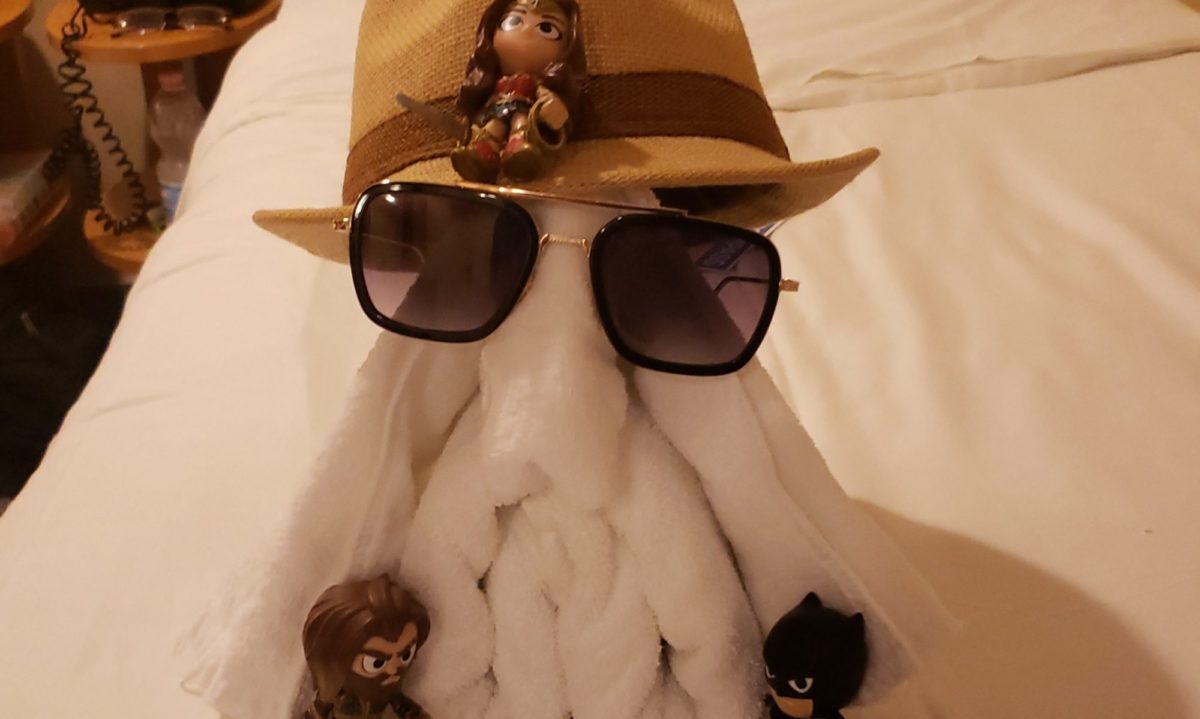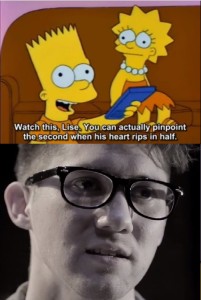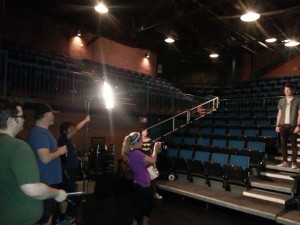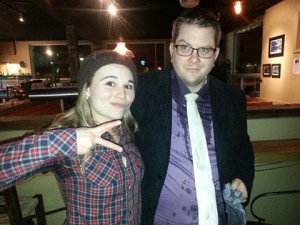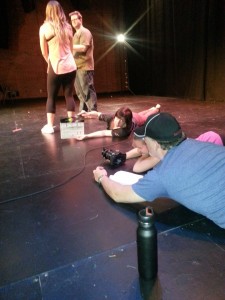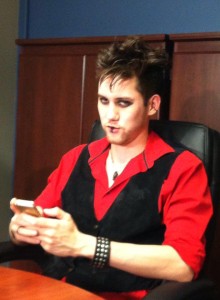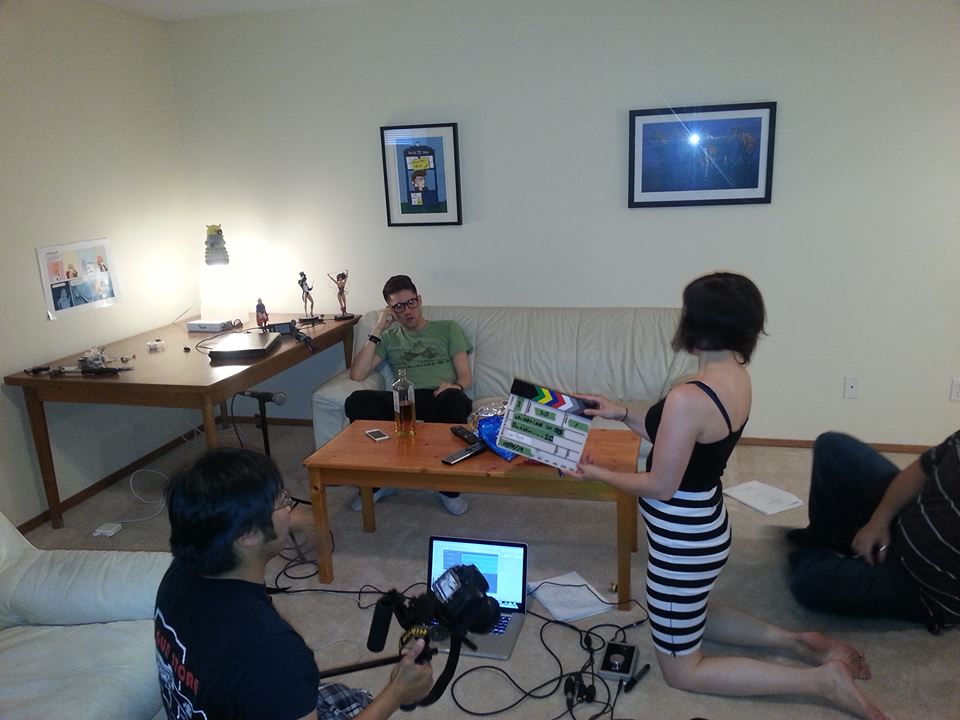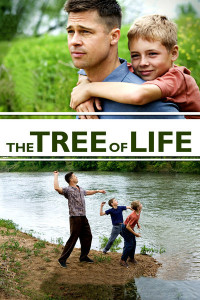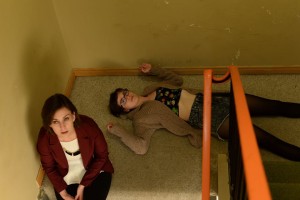You know the drill. Watch this, then we chat.
Okay. Here goes.
Finding it as you go
The beginning of this episode shifted somewhat between casting and production. Originally, it was Zoe who’d failed to notice that Jeff was in the room. And when Anna (who plays Zoe) and Aaron (who plays Jeff) read that at Anna’s audition (Aaron having been cast some time earlier), it was certainly funny… but as you may recall from two weeks ago, we had a running gag building in which Jeff was habitually unable (or unwilling, maybe?) to tell that Zoe was in the room. Or recall her name. Zoe not noticing that handsy womanizer Jeff Winnick wasn’t in the somewhat small writers’ room would be a) weird, and b) actively contradictory to the other bit, which had more legs.
(Yes, I shift between actor name and character name a lot. Yes, I know it’s potentially confusing. No, that doesn’t mean I’m going to stop.)
So while it always pains me a little to cut a joke, I rewrote the opening of the episode to reflect this new status quo that several other episodes established. And hey, the new joke turned out possibly even better. Because as funny as Anna’s reaction was to Aaron sneaking up on her, that pan over to reveal she’s been in the room the whole phone call just killed me the first time through. Hopefully you agree.
There’s a lot of this. On network television, they’re producing episodes from August until April, and get a chance to react to audience expectation. Play to their strengths, work on their weaknesses… well, in theory. Lord knows the writers of Gotham haven’t done much to make Barbara Kean less of a train wreck, but Arrow certainly adapted. Other shows, like House of Cards or Game of Thrones, film their entire seasons in one go, then release afterwards. All 13 episodes of Unbreakable Kimmy Schmidt come out in one burst, so if there’s oh, I don’t know, a controversy about how they handle their minority characters, there’s not much they can do about that until season two.
We’re in a similar situation (he said, desperately trying to avoid saying “We’re like Game of Thrones,” aka. the most egotistical thing he could say in this context), in that the entire series finished photography three months before our first episodes went live. We didn’t even shoot episode by episode… as I said earlier, anything involving all four writers in the Writers’ Room had to be shot during Super Fun Happy Good Times Week. So it’s not like we could shoot a couple of episodes, review the dailies, learn what we could do better and brush up the next episode before we rolled cameras.
It’s a learn-as-you-go process. You just hope the seams don’t show too much. This topic got away from me a little. Let’s move on.
Like, Share, Subscribe
I probably watch the most internet videos of any of the executive producers (he said, his tone implying this wasn’t so much a brag as a shameful confession). This means that I put the most thought into little things like the difference between YouTube, Vimeo (YouTube’s pretentious cousin), and DailyMotion (the cousin from a dysfunctional family that YouTube and Vimeo don’t like to talk about), or more relevantly, how to do a good “Like, Share, Subscribe” short (or, as we call them, LSS) to run under the credits. Vlog-style channels like Jenna Marbles will just sign off for the week by reminding you to subscribe to the channel; more production-intensive channels like Cracked Studios and College Humor (spelling it without the U kills me a little, but that’s how they spell it, so…) have to run actual credits, so they fill that time with a quick bit to encourage you to like and share and subscribe, those things that don’t seem important until you’re on the other side of the video, when they become everything.
Now there’s a couple of ways to go here, and my two examples use both interchangeably. You can do an LSS custom tailored to the video… examples include Cracked’s Rom.Com (season two, anyway) and After Hours, or at least half of College Humor’s Adam Ruins Everything videos… or you can shoot something quick and generic that you can slap on the end of basically any video. Cody from Cracked or Emily from College Humor pointing out the like, subscribe, or “Watch more videos” buttons. Effective, but I find something disengaging about Cody saying “Thanks for watching… whatever that was.” I’d rather the request to subscribe be accompanied by Daniel O’Brien explaining that Soren Bowie wrote “Everyone is eating pie” into the stage directions for no reason other than he wanted pie.
I sort of split the difference. On occasion, our LSS bits are tailored towards the specific episode… most notably Brent’s on episode two… but for the most part, I wrote LSS bits for all of the main characters, and we figured out the best episodes to pair with each one. For instance, an episode about the horrors of the comments section fits well with an LSS about Zoe being traumatized by the comments section (one of my two favourites).
Random facts!
I directed the section with Zoe and Jeff locked in the side room. Which, let me tell you, was a bit tricky. The side rooms aren’t very big: we needed room for Zoe, Jeff, lights, the camera, the sound equipment, plus me and Ian, and possibly Tawni, who was typically on slate, but might not have been there that day. So I was cramped into one corner, directing the shots while running sound, with no chair. I have had old-man-knees since I was 15. I would typically lose all feeling in my legs during the shot.
The poster you can see on the window (albeit backwards) is for a band we know called Thwomp. They do rock covers of video games. They’re pretty awesome. You can find their music right here if metal covers of Mega Man music appeal to you, and how could they not.
I needed something for Zoe to be listening to on her way into the building, to cover the fact she didn’t notice Jeff’s ranting, or, as it turned out when we actually staged and shot it, Becky waiting in ambush. Zoe seemed the exact type to enjoy Jonathan Coulton. Because she’s on the geeky side and has a heart and feelings, so of course she likes Jonathan Coulton.
The trick about punchlines
In the punchline of this week’s episode, Jeff asks if Zoe deals with this sort of thing on her blog. After saying “I’m a woman. On the internet,” she decides he’s had enough for one day, and says that, no, everyone who comments on her blog is totally respectful.
Wasn’t the original punchline.
Because I spend a lot of time online, and have these crazy thoughts that maybe every woman I’ve ever cared about or will ever meet shouldn’t have to deal with a misogynist culture or live under the constant threat of sexual violence from men, I am well aware about what Zoe would have to deal with on her blog.
Jeff gets mean comments that his film might not be very good. Zoe gets threatened with rape and death if she expresses an opinion about a comic book.
And this episode was written before the real-life horror movie that is GamerGate got started, and “doxxing” and “Swatting” entered the common lexicon.
So I considered having the punchline of the episode be a little different, acknowledging what I was sadly confident would be part of Zoe’s day-to-day life. But we decided that might be a little too dark. Dark’s all well and good in the set up, but if you’re working it into the punchline, you’d better be confident your audience is going to be okay with that. It’s Always Sunny in Philadelphia trains its audience to expect a dark punchline to a dark premise; we didn’t have that expectation. So I went the other way. I think it works better. Provides a nice end moment instead of something that would just get Jeff spun up again.
Which is not to say that we shy away from controversial jokes. As we’ll see next week, when we talk about the yelling fight Keith and I had in a pub about… well, I wouldn’t want to give it away.
Seriously, like, share, subscribe, and comment on the videos. YouTube pays attention to that stuff.
